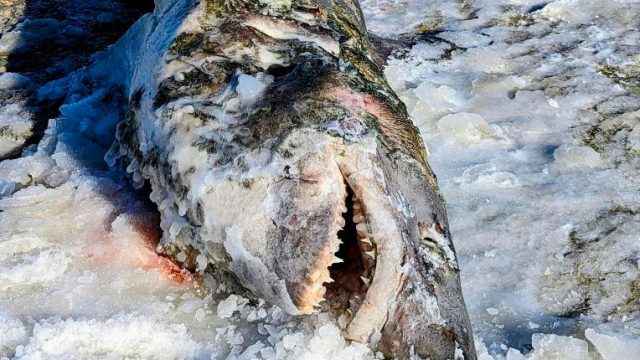
Shark sightings have increasingly been reported worldwide over the past few years, but previously quite not like this: A partially frozen porbeagle shark washed up on a Cape Cod, Massachusetts, beach over the weekend. The sighting occurred during last weekend’s cold snap in the Northeast, which interrupted a relatively mild winter.
The deceased fish was snapped by a local photographer on Cold Storage Beach in Dennis around 2:30 pm Saturday and posted to her Instagram account, the New York Post reported. Read on to find out more, including what experts believe may have caused the shark to run aground.
Photographer Shocked By Discovery
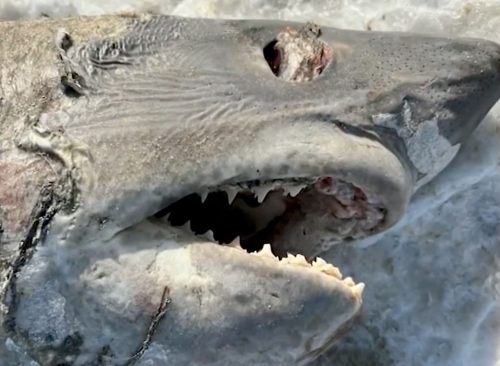
The photographer, Amie Medeiros, said the shark was “not what I was expecting to find on my frozen winter adventure,” in the comments on her Instagram post. The fish may have died from an injury to its side, the Post reported. Mederios’ photographs show it apparently has large cuts above its fins.
Expert Identified Porbeagle Shark

On his Twitter account, shark biologist John Chisholm of the New England Aquarium identified the shark as a porbeagle and said another one had washed up in the area last week and “has been moving around with the big tides.” About six porbeagle sharks have washed up on shore this season. This particular shark was close to the parking lot at Cold Storage Beach, enabling a number of people to take photos that went viral over the weekend.
Cold Temperatures Probably Not Responsible

The weekend’s “polar vortex” weather system brought subzero temperatures: Boston reached ten degrees below zero, the coldest in decades. But that’s probably not what killed the shark, Chisholm told local station NBC Boston. It likely died at sea, washed up on shore, then froze.
“We don’t know what killed it,” said Chisholm. “It’s pretty decomposed.” He said porbeagle sharks are common year-round off the Massachusetts coast because they warm-blooded animals are fond of the cold water. “It’s been dead for a while, so it definitely died before the cold snap,” said Chisholm.
Body Was Dismembered Before Scientists Could Study
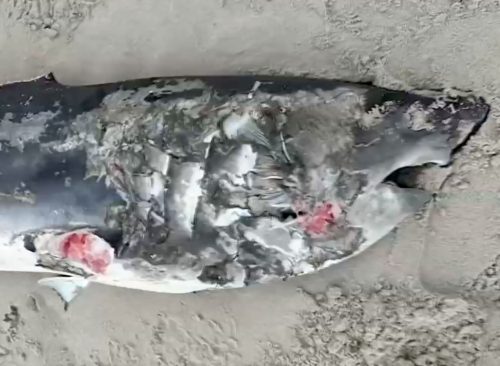
Unfortunately, when Chisholm visited the area to study the shark, he discovered that someone had dismembered its body, taking its fins, tail, and most of its teeth. “We like to get a complete sample when we can, but the people had already beat us to it,” he told NBC Boston.
Removing a shark’s fins or tail is a crime punishable by up to 60 days in jail and fines of up to $1,000. “I’m sad sharks have that kind of quality that people want to take things from them,” said Kathy Miller, a volunteer with the New England Coastal Wildlife Alliance, told the station.
“The Past, Sealed Away”
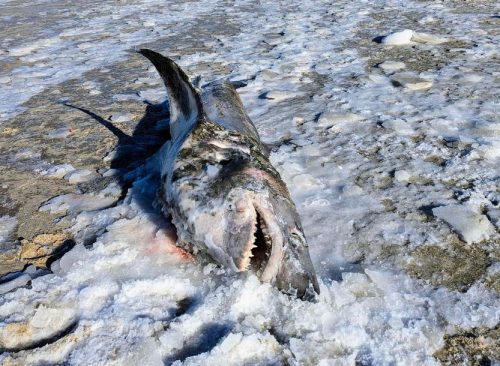
Medeiros quoted author Haruki Murakami in her viral post. “Ice contains no future, just the past, sealed away. As if they’re alive, everything in the world is sealed up inside, clear and distinct. Ice can preserve all kinds of things that way — cleanly, clearly. That’s the essence of ice, the role it plays,” she wrote.
Porpoise and Beagle
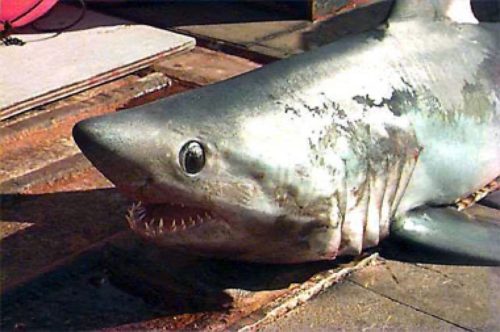
The porbeagle shark (Lamnidae) is a species of mackerel shark found in cold and temperate marine waters of the North Atlantic and Southern Hemisphere. Scholars have proposed that the porbeagle shark’s name originates from the combination of “porpoise” and “beagle” – referencing the shark’s rounded body and dogged hunting methods.
It typically grows to 2.5 m in length and a weight of 135 kg, with North Atlantic sharks being larger than those in the Southern Hemisphere. It has a gray back and white underside, a stout midsection, a long pointed snout, and a narrow base of the tail. It has large pectoral and first dorsal fins, tiny pelvic, second dorsal, and anal fins, and a crescent-shaped caudal fin. Its most distinctive features are its three-cusped teeth, the white blotch at the aft base of its first dorsal fin, and the two pairs of lateral keels on its tail.
Rarely Attacks Humans
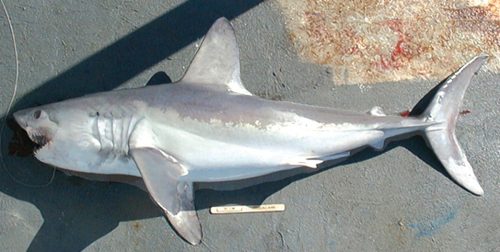
The porbeagle is related to the shortfin mako and white shark but rarely attacks humans. According to the International Shark Attack File (ISAF), there have been two unprovoked attacks by porbeagles off England and Canada, both on divers and both non-fatal. Although the porbeagle can get as large as 12 feet long and 500 pounds, it is only considered moderately dangerous to humans.














